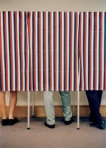 Did you know that your vote doesn’t really decide who becomes President? It does indirectly, but you are really casting a vote to let someone else know who you want them to vote for. Many people don’t understand the current electoral system. And it can be a bit confusing. So, let me simplify it as much as I can.
Did you know that your vote doesn’t really decide who becomes President? It does indirectly, but you are really casting a vote to let someone else know who you want them to vote for. Many people don’t understand the current electoral system. And it can be a bit confusing. So, let me simplify it as much as I can.
When you vote for a presidential candidate you are really voting to instruct the electors from your state to cast their votes for the same candidate. For example, if you vote for the Republican candidate, you are really voting for an elector (delegate) who will be “pledged” to vote for the Republican candidate. The candidate who wins the popular vote in a state wins all the pledged votes of the state’s electors. In some states, those electors are required to vote for the candidate who received the popular vote. However some states do not require candidate loyalty and those electors can cast their vote for whoever they choose.
Some say that the current system is flawed because it allows for a candidate to win the vote of the people (popular vote) but lose the election. This is because in order for a candidate to win the election, he or she must receive a total of 270 electoral votes to become president. There are 538 in all. If a candidate were to win the popular vote in 11 of 12 states, they would receive enough electoral votes to win the Presidency. The 12 states are:
California
New York
Texas
Florida
Pennsylvania
Illinois
Ohio
Michigan
New Jersey
North Carolina
Georgia
Virginia
Has a candidate ever won the popular vote and not won the Presidency? Yes they have, but only three times in history.
The electoral system that we currently use is lambasted by many opponents as unjust. It is set up, however, to insure that a candidate with only regional appeal or popularity doesn’t win. It has worked reasonably well for 200 years. So, regardless of how you feel about our current system of electing a president, I hope that you will go out and vote. Every vote does count, though maybe not in the way you would think.
To read more on the Electoral College please visit the links below.
How the Electoral College Works –Howstuffworks.com
The Electoral College: How It Works In Contemporary Presidential Elections – Congressional Report
